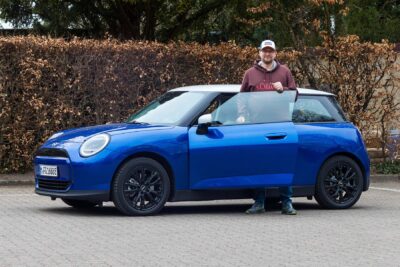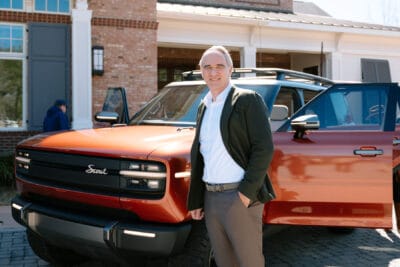e.GO Mobile boss exposes German finance culture
Günther Schuh, head of e.Go Mobile, also co-founder of StreetScooter and an Aachen University professor expressed disappointment with German financial institutions and the culture of hesitancy. He also speaks about e.GO Mobile’s current investment structure at home and in China in detail.
The last few weeks and months have been eventful for e.GO Mobile and Günther Schuh. At the end of December, the Aachen-based electric car manufacturer revealed it had been on the verge of insolvency since October 2019 and had only been able to prevent bankruptcy with additional funds from investors. Earlier this month, the start-up, which was launched in 2015, announced that it was setting up a joint venture with a Chinese company to produce a Chinese version of the e.GO Life. Only a matter of weeks stood between near bankruptcy and the significant international deal.
Despite the positive development, the German electric vehicle startup’s fiscal problems have still not been overcome: 100 million euros must be paid back to those shareholders supporting the startup by the end of March – otherwise, those shareholders have the right to exchange their claims for ordinary shares. In an interview with the German magazine Focus, Schuh said he was not overly concerned by this prospect, saying that there was no indication that the shareholders would utilise this option. “They could just as well let the loan continue”, said Schuh. “But even if everyone exercised the right to convert to shares, no one would have a blocking minority.”
Schuh was quite specific about several financial details in the interview. He revealed that so far, e.GO Mobile has collected 310 million euros from investors. The founder explained that the startup’s business requirements to be able to stand “on their own two feet” amounted to 105 million euros. “We have secured over 50 million of this as equity from our Chinese partner,” said the e.GO CEO. “The contracts have been signed, the transfer of the money is underway.” Talks are also in progress for the remaining 55 million euros with “six other potential investors”, although Schuh did not mention names. He also said he was unable to name e.GO’s China partner until the company announced the joint venture publically to stock exchanges. He said he could currently only reveal that the Chinese company is a listed manufacturer from the private sector.
Further details about e.GO included the company’s immediate fiscal planning. Schuh said that this year e.GO will make a loss of 20 to 60 million euros, and he wants to achieve a positive cash flow as early as 2021, hoping to become creditworthy vis-à-vis the banks. He said that the recurring financing rounds, through which e.GO Mobile has financed itself so far, have been “exhausting”.
While Schuh has to convince investors and rethink his strategy every six to nine months because of the financing rounds in Europe, the plans in China are more long-term. According to Schuh, e.GO will initially hold 40 per cent of the joint venture, after five years, the shares will slowly increase until, in seven or eight years, both partners will hold half each. In the first phase, e.GO will only bring in one million euros, although 140 million euros will be invested in the entire plant (the location of which is also hush-hush at the moment). The cash flow from the first sales will be invested in further model variants.
In the interview, Schuh spoke unusually openly about the details of the agreement. “We will receive money for the know-how and development services we bring in,” said Schuh, for example. “We also get royalties on every car sold, whether the joint venture makes money or not.” Due to the high-cost bureaucracy in the development of the e.GO Life, with some modifications it will be possible to offer the vehicle 30 to 35 per cent cheaper than in Germany. “When production starts up, we want to get below 10,000 euros,” said Schuh.
Concerning Chinese cuts to EV subsidies and the effects on EV sales in China, Schuh was asked if he had reservations about producing in China under these conditions. He answered that this is precisely the kind of atmosphere that is good for the type of vehicles that e.GO is producing – namely those with a strict “cost discipline in production”. Indeed, e.GO creates purpose-built, no-fuss cars, not the kind of Wild West EV production that Chinese authorities are trying to sort out. All the more disappointing that the company has not been able to produce more in Germany, the country famous for effective rather than extraneous technology.
Not surprisingly, Schuh seems saddened that the planned production has not been made possible in Germany. Schuh is particularly troubled by Germany’s financing culture, which has been similarly problematic for the Munich start-up Sono Motors. “In California or China, when car start-ups enter the industrialisation phase, they already receive 1.5 or 2.5 billion dollars from their sponsors,” says the Aachen professor. “In ‘Savingsbank Germany’ you have to fight for every 100 million euros.” When Focus interviewer Susanne Stephan asked Günter Schuh if he would do it all again in light of his current experience, he said: “I don’t believe I would do it again.”
For plans, Schuh revealed that e.GO is aiming for further joint ventures in Canada or Mexico. He explained that “Production for the low-price segment cannot tolerate tourism for different auto parts. That’s why all parts for the planned additional factories will come from the immediate regional environment.”
On the German front, support might come from Wolfsburg. About a year ago at the Geneva Motor Show, Volkswagen CEO Wolfgang Diess indicated that e.GO might produce the VW electric beach buggy. “Discussions on the subject are making progress,” said Schuh. “I bet that Diess will make an announcement on this at the Motor Show in early March.”
focus.de (in German)





0 Comments